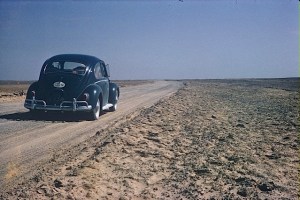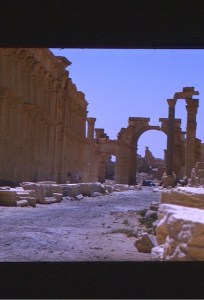In 1965 Ross and I visited Syria. It was a time when the country was peaceful, the economy was growing, literacy rates were improving, and the people we met were gracious and hospitable. We loved our long drive through the Great Syrian Desert and reflected on it for many years before I wrote “Desert Coffee.” The story became Chapter Five of my 2013 book, “Weaving Threads Travels on the Silk Road.”
Today I think a lot about Syrian children. There are 8.5 million of them living in unspeakable horror and desperate need in Syria and surrounding countries. Some are victims of the worst forms of child labour in armed conflict and sexual exploitation.
Organizations like UNICEF (that I know well and love) are there, inside Syria and surrounding countries helping children survive. (Go to www.unicef.ca . Urgent Appeal. Children of Syria Winter Crisis for more information.)
I hope that in 2016 Syrian children will have a safer place to live, be well nourished and healthy, be able to learn to read write and count and grow up to be responsible and caring, like those we met in the desert fifty years ago.
Chapter Five
DESERT COFFEE Syria 1965
The battered old aluminium coffee pot filled with warped wooden gadgets that you see on my kitchen counter is special.
One night we almost used it as a weapon.
“Why are you going there? It’s very dangerous,” they said.“What ever you do don’t travel at night. Bedouin will rob you. After they riddle you with bullets.”
And so we set off anyway.
The Beetle bumps across a furnace of connected deserts and oasis towns. Everything around us is flat. Hard brown sand glistens like diamonds under a fireball sun.
The heat is unbearable.
I read that Gertrude Bell wore heavy wool to keep the sun out when she crossed this desert on a camel during the First World War. So did Lawrence. We wear bath towels. Heavy, brown, wet ones. Wet towels over our heads, wet towels over our shoulders and wet towels across our laps. And then we jam wet, brown towels into closed car windows to keep the hot blast of desert air out and block the burning sun.
The sun. The heat. The emptiness. There is so much of nothing here.
It is cooler now, the evening is beautiful and still. A massive orange sun seems unreal to us, as it slowly sinks into the sand.
“We really shouldn’t camp here,” I snap. “They warned it was dangerous. They said don’t camp in the desert under any circumstances. Bedouin are everywhere. They’re thieves. They’ll kidnap us,”
“There is no one anywhere near here,” Ross says softly. “Why would anyone be here? There’s nothing.”
He’s right. We haven’t seen anyone all day. I take a deep breath, calm myself and confess. “Actually, you know I’ve always wanted to sleep on the desert, under the stars.”
So here we are. This is the Great Syrian Desert and, like Lawrence of Arabia and Gertrude Bell, we are on our way to explore Palmyra.
Sand, the colour of nicely ripe peaches, is all around as far as we can see. The heat of the day dissipates as the sun lowers. Dusk begins to settle in. The moon brightens, stars begin to break through day into night, first one, then two, and now a few more.
It reminds me of the Christmas story.
We unfold the little Danish wooden camping table, smooth on the red and white plastic tablecloth, set out our shiny stainless steel cutlery and our brown stoneware coffee cups from Finland. The new Italian coffee pot is popping, sputtering and exploding, gathering pressure on the little diesel-fuelled camp stove set in the sand. Soon we will have a nice cup of coffee. We have not forgotten to bring all the trappings, of what, we think, is civilization.
“Do you see that?” Ross says, pointing to the darkening night in the east.
“What is it?”
“I don’t know. An animal? It looks like a camel.”
Black and ghostly, the apparition gathers momentum in a storm of swirling sand. “It’s coming toward us. It’s someone on a horse, ” Ross stammers in disbelief.
“It’s Bedouin,” I screech.
Long, flowing, black robes fly in the wind behind him. He holds a wooden staff in his right fist. He raises his arm high. Like a scene from Lawrence of Arabia he is fierce and relentless in his gallop toward us.
“What are we going to do?”
Ross grabs the hot coffee pot. “This’ll work.”
“What? You’ll throw it? At him?”
Months ago we discussed carrying a weapon. Most people we spoke to, who crossed this desert, carried a gun for protection. We thought about it and decided that if anything bad happened we would be too scared and inept to shoot anyone. They would shoot us. With our gun.
Now here we are. Scared. Inept. But keen to live. The coffee pot will have to do.
In an explosion of sand, the man reins his horse to a high-speed stop beside us. The coffee pot is poised, ready for action.
But wait a minute. The Bedouin’s turban frames a kind, smiling face.
“Salaam Alaikum.” Peace to you, he says softly.
“Well now. Salaam Alaikum. Salaam Alaikum. Yes. Yes.” Ross blurts out, raising the coffee pot in his trembling hands high in the air. “Hey, would you like some coffee?”
The Bedouin smiles broadly again and says something we don’t really understand, shoots his arm high in the air, waves and charges off into the empty, bleak desert.
We are stunned. After a moment we collapse in laughter. At ourselves.
“He’s going somewhere fast. Probably home for supper,” Ross says.
Relief and happiness take over our fear as we lay down in the sand under the stars.
The morning is cold but the sun is beginning to soar and we know we will be in the furnace again soon. We pack up our little home in the desert and get in the car to leave.
But look.
There he is again. Children are with him, three boys, about ten or twelve, laughing and jostling one another, each on his own magnificent horse. They grind to another one of those high-speed horse stops in a cloud of sand, and the man, smiling broadly, gestures that these are his children.
Apparently they have something special for us.
With dad’s coaching, they shyly present us with a present. Three freshly picked watermelons.
Their gift has warmed my heart for a lifetime. And I will never throw out that coffee pot.
This morning I drove from Canmore to the Banff Centre down the Trans-Canada highway. The road was lined with bright yellow aspens. The sun cast a hue of golden magic on Cascade Mountain.
I was thinking about telling you my story about the Silk Road, the little boys, the watermelons and our coffee pot. Neil Young was singing on the car radio. Was it by chance for me?
I crossed the ocean for a heart of gold.
I want to be miner for a heart of gold
These expressions keep me searching for a heart of gold.
Keep me searching. *
Salaam Alaikum
* Young, Neil. Greatest Hits. Heart of Gold. Reprise records, 2004.
